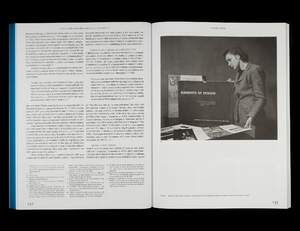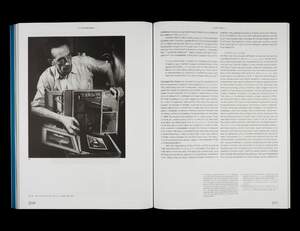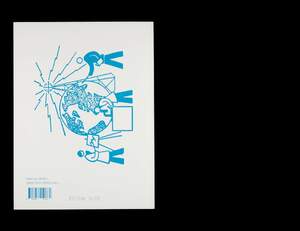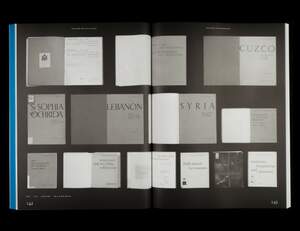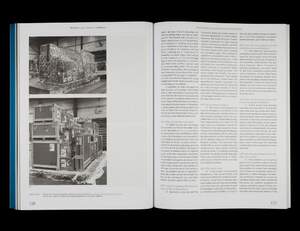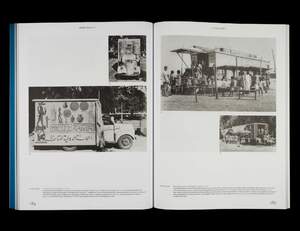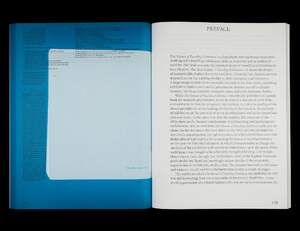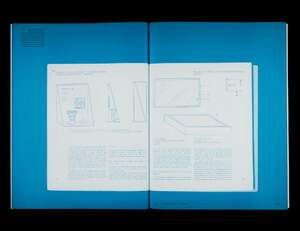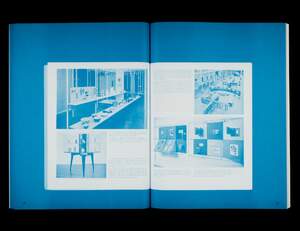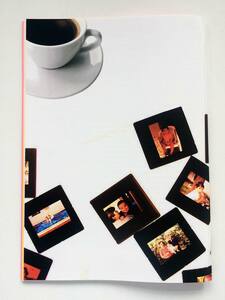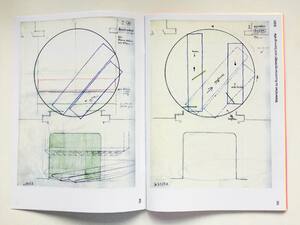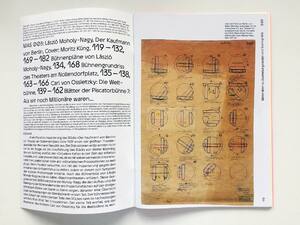Johannes Hucht
| Name | Johannes Hucht |
22 Inhalte
- Seite 1 von 2
Re-reading the Manual of Travelling Exhibitions, UNESCO 1953
- Titel
- Re-reading the Manual of Travelling Exhibitions, UNESCO 1953
- Titel (en)
- Re-reading the Manual of Travelling Exhibitions, UNESCO 1953
- Autor/in
- Beschreibung (de)
-
Das 1953 von der UNESCO herausgegebene "Manual of Travelling Exhibitions" ist ein Handbuch zur Organisation von Wanderausstellungen. An Museen und andere öffentliche Institutionen gerichtet, formuliert es eine Grammatik des Ausstellens: von organisatorischen Fragen bis zum Ausstellungsdesign. Das „Manual“ liest sich aus heutiger Sicht wie ein Manifest einer noch ungebrochenen Moderne der unmittelbaren Nachkriegszeit.
Ein umfangreich kommentierter Reprint des "Manual of Travelling Exhibitions" soll zum einen die historische Quelle kontextualisieren und kritisch hinterfragen, zum anderen verschiedene Formen der Aktualisierung aufzeigen. Dabei sind die Inhalte des „Manual“ ebenso bedeutsam wie seine immanenten Fehlstellen, die Buchgestaltung oder die fotografische Logik der Abbildungen.
-
- Beschreibung (en)
- "The Manual of Travelling Exhibitions" published by UNESCO in 1953 is a handbook on organizing touring exhibitions. Aimed at museums and other public institutions, it formulates a “grammar” of how to exhibit, ranging from organizational questions to reflections on exhibition design. From today’s perspective the manual reads like the manifesto of a modernity whose continuity was still unbroken in the immediate post-war period. This extensively annotated reprint of the "Manual of Travelling Exhibitions" is intended, on the one hand, to contextualize and critically examine the historical source and, on the other, to show different ways of updating it. The contents of the manual share the same importance as the inherent gaps it contains, the book’s design, and the photographic logic of the images.
- Typ des Projekts/Werks
- Schlagworte
- Datierung
- November 2018
- Mitwirkende
- Dank an
- Sprache
- Abmessungen
- 23,5 x 31 cm
- Stadt
- Land
- Internetlinks
- Bemerkungen
-
247 Seiten
Reproduktion des Originals und 20 weitere Abbildungen
fadengeheftete Broschur
ISBN: 9783959051361
Spector Books
Designer: Lena Thomaka, Johannes Hucht
Text: Martin Beck, Clémentine Deliss, Kurt Eckert, Jochen Eisenbrand, Rike Franke, Helene Hermann, Lydia Kähny, Tina Köhler, Moritz Küng, Sophie Lichtenberg, Jonathan Maho, Vanessa Joan Müller, Andreas Müller, Jennifer Tobias, Gitte Villesen, Nader Vossoughian, Florian Walzel, Grant Watson, Joanna Weddell, Maxim Weirich, Aaron Werbick
Herausgebende: Andreas Müller, Lydia Kähny, Sophie Lichtenberg, Aaron Werbick, Maxim Weirich
-
- Titel
- Re-reading the Manual of Travelling Exhibitions, UNESCO 1953
- Urheberrechtshinweis
- Andreas Müller, Lydia Kähny, Sophie Lichtenberg, Aaron Werbick, Maxim Weirich; Verlag: Spector Books; Grafik: Johannes Hucht, Lena Thomaka
- Rechtsschutz/Lizenz
- Beziehung/Funktion
- Projektleiter/in
- Semester
- Lehrveranstaltung
- Importiert am
- 29.06.2023
- Übergeordnete Sets
- 1
Re-reading the Manual of Travelling Exhibitions, UNESCO 1953
- Titel
- Re-reading the Manual of Travelling Exhibitions, UNESCO 1953
- Titel (en)
- Re-reading the Manual of Travelling Exhibitions, UNESCO 1953
- Autor/in
- Beschreibung (de)
-
Das 1953 von der UNESCO herausgegebene "Manual of Travelling Exhibitions" ist ein Handbuch zur Organisation von Wanderausstellungen. An Museen und andere öffentliche Institutionen gerichtet, formuliert es eine Grammatik des Ausstellens: von organisatorischen Fragen bis zum Ausstellungsdesign. Das „Manual“ liest sich aus heutiger Sicht wie ein Manifest einer noch ungebrochenen Moderne der unmittelbaren Nachkriegszeit.
Ein umfangreich kommentierter Reprint des "Manual of Travelling Exhibitions" soll zum einen die historische Quelle kontextualisieren und kritisch hinterfragen, zum anderen verschiedene Formen der Aktualisierung aufzeigen. Dabei sind die Inhalte des „Manual“ ebenso bedeutsam wie seine immanenten Fehlstellen, die Buchgestaltung oder die fotografische Logik der Abbildungen.
-
- Beschreibung (en)
- "The Manual of Travelling Exhibitions" published by UNESCO in 1953 is a handbook on organizing touring exhibitions. Aimed at museums and other public institutions, it formulates a “grammar” of how to exhibit, ranging from organizational questions to reflections on exhibition design. From today’s perspective the manual reads like the manifesto of a modernity whose continuity was still unbroken in the immediate post-war period. This extensively annotated reprint of the "Manual of Travelling Exhibitions" is intended, on the one hand, to contextualize and critically examine the historical source and, on the other, to show different ways of updating it. The contents of the manual share the same importance as the inherent gaps it contains, the book’s design, and the photographic logic of the images.
- Typ des Projekts/Werks
- Schlagworte
- Datierung
- November 2018
- Mitwirkende
- Dank an
- Sprache
- Abmessungen
- 23,5 x 31 cm
- Stadt
- Land
- Internetlinks
- Bemerkungen
-
247 Seiten
Reproduktion des Originals und 20 weitere Abbildungen
fadengeheftete Broschur
ISBN: 9783959051361
Spector Books
Designer: Lena Thomaka, Johannes Hucht
Text: Martin Beck, Clémentine Deliss, Kurt Eckert, Jochen Eisenbrand, Rike Franke, Helene Hermann, Lydia Kähny, Tina Köhler, Moritz Küng, Sophie Lichtenberg, Jonathan Maho, Vanessa Joan Müller, Andreas Müller, Jennifer Tobias, Gitte Villesen, Nader Vossoughian, Florian Walzel, Grant Watson, Joanna Weddell, Maxim Weirich, Aaron Werbick
Herausgebende: Andreas Müller, Lydia Kähny, Sophie Lichtenberg, Aaron Werbick, Maxim Weirich
-
- Titel
- Re-reading the Manual of Travelling Exhibitions, UNESCO 1953
- Urheberrechtshinweis
- Andreas Müller, Lydia Kähny, Sophie Lichtenberg, Aaron Werbick, Maxim Weirich; Verlag: Spector Books; Grafik: Johannes Hucht, Lena Thomaka
- Rechtsschutz/Lizenz
- Beziehung/Funktion
- Projektleiter/in
- Semester
- Lehrveranstaltung
- Importiert am
- 29.06.2023
- Übergeordnete Sets
- 1
Re-reading the Manual of Travelling Exhibitions, UNESCO 1953
- Titel
- Re-reading the Manual of Travelling Exhibitions, UNESCO 1953
- Titel (en)
- Re-reading the Manual of Travelling Exhibitions, UNESCO 1953
- Autor/in
- Beschreibung (de)
-
Das 1953 von der UNESCO herausgegebene "Manual of Travelling Exhibitions" ist ein Handbuch zur Organisation von Wanderausstellungen. An Museen und andere öffentliche Institutionen gerichtet, formuliert es eine Grammatik des Ausstellens: von organisatorischen Fragen bis zum Ausstellungsdesign. Das „Manual“ liest sich aus heutiger Sicht wie ein Manifest einer noch ungebrochenen Moderne der unmittelbaren Nachkriegszeit.
Ein umfangreich kommentierter Reprint des "Manual of Travelling Exhibitions" soll zum einen die historische Quelle kontextualisieren und kritisch hinterfragen, zum anderen verschiedene Formen der Aktualisierung aufzeigen. Dabei sind die Inhalte des „Manual“ ebenso bedeutsam wie seine immanenten Fehlstellen, die Buchgestaltung oder die fotografische Logik der Abbildungen.
-
- Beschreibung (en)
- "The Manual of Travelling Exhibitions" published by UNESCO in 1953 is a handbook on organizing touring exhibitions. Aimed at museums and other public institutions, it formulates a “grammar” of how to exhibit, ranging from organizational questions to reflections on exhibition design. From today’s perspective the manual reads like the manifesto of a modernity whose continuity was still unbroken in the immediate post-war period. This extensively annotated reprint of the "Manual of Travelling Exhibitions" is intended, on the one hand, to contextualize and critically examine the historical source and, on the other, to show different ways of updating it. The contents of the manual share the same importance as the inherent gaps it contains, the book’s design, and the photographic logic of the images.
- Typ des Projekts/Werks
- Schlagworte
- Datierung
- November 2018
- Mitwirkende
- Dank an
- Sprache
- Abmessungen
- 23,5 x 31 cm
- Stadt
- Land
- Internetlinks
- Bemerkungen
-
247 Seiten
Reproduktion des Originals und 20 weitere Abbildungen
fadengeheftete Broschur
ISBN: 9783959051361
Spector Books
Designer: Lena Thomaka, Johannes Hucht
Text: Martin Beck, Clémentine Deliss, Kurt Eckert, Jochen Eisenbrand, Rike Franke, Helene Hermann, Lydia Kähny, Tina Köhler, Moritz Küng, Sophie Lichtenberg, Jonathan Maho, Vanessa Joan Müller, Andreas Müller, Jennifer Tobias, Gitte Villesen, Nader Vossoughian, Florian Walzel, Grant Watson, Joanna Weddell, Maxim Weirich, Aaron Werbick
Herausgebende: Andreas Müller, Lydia Kähny, Sophie Lichtenberg, Aaron Werbick, Maxim Weirich
-
- Titel
- Re-reading the Manual of Travelling Exhibitions, UNESCO 1953
- Urheberrechtshinweis
- Andreas Müller, Lydia Kähny, Sophie Lichtenberg, Aaron Werbick, Maxim Weirich; Verlag: Spector Books; Grafik: Johannes Hucht, Lena Thomaka
- Rechtsschutz/Lizenz
- Beziehung/Funktion
- Projektleiter/in
- Semester
- Lehrveranstaltung
- Importiert am
- 29.06.2023
- Übergeordnete Sets
- 1
Re-reading the Manual of Travelling Exhibitions, UNESCO 1953
- Titel
- Re-reading the Manual of Travelling Exhibitions, UNESCO 1953
- Titel (en)
- Re-reading the Manual of Travelling Exhibitions, UNESCO 1953
- Autor/in
- Beschreibung (de)
-
Das 1953 von der UNESCO herausgegebene "Manual of Travelling Exhibitions" ist ein Handbuch zur Organisation von Wanderausstellungen. An Museen und andere öffentliche Institutionen gerichtet, formuliert es eine Grammatik des Ausstellens: von organisatorischen Fragen bis zum Ausstellungsdesign. Das „Manual“ liest sich aus heutiger Sicht wie ein Manifest einer noch ungebrochenen Moderne der unmittelbaren Nachkriegszeit.
Ein umfangreich kommentierter Reprint des "Manual of Travelling Exhibitions" soll zum einen die historische Quelle kontextualisieren und kritisch hinterfragen, zum anderen verschiedene Formen der Aktualisierung aufzeigen. Dabei sind die Inhalte des „Manual“ ebenso bedeutsam wie seine immanenten Fehlstellen, die Buchgestaltung oder die fotografische Logik der Abbildungen.
-
- Beschreibung (en)
- "The Manual of Travelling Exhibitions" published by UNESCO in 1953 is a handbook on organizing touring exhibitions. Aimed at museums and other public institutions, it formulates a “grammar” of how to exhibit, ranging from organizational questions to reflections on exhibition design. From today’s perspective the manual reads like the manifesto of a modernity whose continuity was still unbroken in the immediate post-war period. This extensively annotated reprint of the "Manual of Travelling Exhibitions" is intended, on the one hand, to contextualize and critically examine the historical source and, on the other, to show different ways of updating it. The contents of the manual share the same importance as the inherent gaps it contains, the book’s design, and the photographic logic of the images.
- Typ des Projekts/Werks
- Schlagworte
- Datierung
- November 2018
- Mitwirkende
- Dank an
- Sprache
- Abmessungen
- 23,5 x 31 cm
- Stadt
- Land
- Internetlinks
- Bemerkungen
-
247 Seiten
Reproduktion des Originals und 20 weitere Abbildungen
fadengeheftete Broschur
ISBN: 9783959051361
Spector Books
Designer: Lena Thomaka, Johannes Hucht
Text: Martin Beck, Clémentine Deliss, Kurt Eckert, Jochen Eisenbrand, Rike Franke, Helene Hermann, Lydia Kähny, Tina Köhler, Moritz Küng, Sophie Lichtenberg, Jonathan Maho, Vanessa Joan Müller, Andreas Müller, Jennifer Tobias, Gitte Villesen, Nader Vossoughian, Florian Walzel, Grant Watson, Joanna Weddell, Maxim Weirich, Aaron Werbick
Herausgebende: Andreas Müller, Lydia Kähny, Sophie Lichtenberg, Aaron Werbick, Maxim Weirich
-
- Titel
- Re-reading the Manual of Travelling Exhibitions, UNESCO 1953
- Urheberrechtshinweis
- Andreas Müller, Lydia Kähny, Sophie Lichtenberg, Aaron Werbick, Maxim Weirich; Verlag: Spector Books; Grafik: Johannes Hucht, Lena Thomaka
- Rechtsschutz/Lizenz
- Beziehung/Funktion
- Projektleiter/in
- Semester
- Lehrveranstaltung
- Importiert am
- 29.06.2023
- Übergeordnete Sets
- 1
Re-reading the Manual of Travelling Exhibitions, UNESCO 1953
- Titel
- Re-reading the Manual of Travelling Exhibitions, UNESCO 1953
- Titel (en)
- Re-reading the Manual of Travelling Exhibitions, UNESCO 1953
- Autor/in
- Beschreibung (de)
-
Das 1953 von der UNESCO herausgegebene "Manual of Travelling Exhibitions" ist ein Handbuch zur Organisation von Wanderausstellungen. An Museen und andere öffentliche Institutionen gerichtet, formuliert es eine Grammatik des Ausstellens: von organisatorischen Fragen bis zum Ausstellungsdesign. Das „Manual“ liest sich aus heutiger Sicht wie ein Manifest einer noch ungebrochenen Moderne der unmittelbaren Nachkriegszeit.
Ein umfangreich kommentierter Reprint des "Manual of Travelling Exhibitions" soll zum einen die historische Quelle kontextualisieren und kritisch hinterfragen, zum anderen verschiedene Formen der Aktualisierung aufzeigen. Dabei sind die Inhalte des „Manual“ ebenso bedeutsam wie seine immanenten Fehlstellen, die Buchgestaltung oder die fotografische Logik der Abbildungen.
-
- Beschreibung (en)
- "The Manual of Travelling Exhibitions" published by UNESCO in 1953 is a handbook on organizing touring exhibitions. Aimed at museums and other public institutions, it formulates a “grammar” of how to exhibit, ranging from organizational questions to reflections on exhibition design. From today’s perspective the manual reads like the manifesto of a modernity whose continuity was still unbroken in the immediate post-war period. This extensively annotated reprint of the "Manual of Travelling Exhibitions" is intended, on the one hand, to contextualize and critically examine the historical source and, on the other, to show different ways of updating it. The contents of the manual share the same importance as the inherent gaps it contains, the book’s design, and the photographic logic of the images.
- Typ des Projekts/Werks
- Schlagworte
- Datierung
- November 2018
- Mitwirkende
- Dank an
- Sprache
- Abmessungen
- 23,5 x 31 cm
- Stadt
- Land
- Internetlinks
- Bemerkungen
-
247 Seiten
Reproduktion des Originals und 20 weitere Abbildungen
fadengeheftete Broschur
ISBN: 9783959051361
Spector Books
Designer: Lena Thomaka, Johannes Hucht
Text: Martin Beck, Clémentine Deliss, Kurt Eckert, Jochen Eisenbrand, Rike Franke, Helene Hermann, Lydia Kähny, Tina Köhler, Moritz Küng, Sophie Lichtenberg, Jonathan Maho, Vanessa Joan Müller, Andreas Müller, Jennifer Tobias, Gitte Villesen, Nader Vossoughian, Florian Walzel, Grant Watson, Joanna Weddell, Maxim Weirich, Aaron Werbick
Herausgebende: Andreas Müller, Lydia Kähny, Sophie Lichtenberg, Aaron Werbick, Maxim Weirich
-
- Titel
- Re-reading the Manual of Travelling Exhibitions, UNESCO 1953
- Urheberrechtshinweis
- Andreas Müller, Lydia Kähny, Sophie Lichtenberg, Aaron Werbick, Maxim Weirich; Verlag: Spector Books; Grafik: Johannes Hucht, Lena Thomaka
- Rechtsschutz/Lizenz
- Beziehung/Funktion
- Projektleiter/in
- Semester
- Lehrveranstaltung
- Importiert am
- 29.06.2023
- Übergeordnete Sets
- 1
Re-reading the Manual of Travelling Exhibitions, UNESCO 1953
- Titel
- Re-reading the Manual of Travelling Exhibitions, UNESCO 1953
- Titel (en)
- Re-reading the Manual of Travelling Exhibitions, UNESCO 1953
- Autor/in
- Beschreibung (de)
-
Das 1953 von der UNESCO herausgegebene "Manual of Travelling Exhibitions" ist ein Handbuch zur Organisation von Wanderausstellungen. An Museen und andere öffentliche Institutionen gerichtet, formuliert es eine Grammatik des Ausstellens: von organisatorischen Fragen bis zum Ausstellungsdesign. Das „Manual“ liest sich aus heutiger Sicht wie ein Manifest einer noch ungebrochenen Moderne der unmittelbaren Nachkriegszeit.
Ein umfangreich kommentierter Reprint des "Manual of Travelling Exhibitions" soll zum einen die historische Quelle kontextualisieren und kritisch hinterfragen, zum anderen verschiedene Formen der Aktualisierung aufzeigen. Dabei sind die Inhalte des „Manual“ ebenso bedeutsam wie seine immanenten Fehlstellen, die Buchgestaltung oder die fotografische Logik der Abbildungen.
-
- Beschreibung (en)
- "The Manual of Travelling Exhibitions" published by UNESCO in 1953 is a handbook on organizing touring exhibitions. Aimed at museums and other public institutions, it formulates a “grammar” of how to exhibit, ranging from organizational questions to reflections on exhibition design. From today’s perspective the manual reads like the manifesto of a modernity whose continuity was still unbroken in the immediate post-war period. This extensively annotated reprint of the "Manual of Travelling Exhibitions" is intended, on the one hand, to contextualize and critically examine the historical source and, on the other, to show different ways of updating it. The contents of the manual share the same importance as the inherent gaps it contains, the book’s design, and the photographic logic of the images.
- Typ des Projekts/Werks
- Schlagworte
- Datierung
- November 2018
- Mitwirkende
- Dank an
- Sprache
- Abmessungen
- 23,5 x 31 cm
- Stadt
- Land
- Internetlinks
- Bemerkungen
-
247 Seiten
Reproduktion des Originals und 20 weitere Abbildungen
fadengeheftete Broschur
ISBN: 9783959051361
Spector Books
Designer: Lena Thomaka, Johannes Hucht
Text: Martin Beck, Clémentine Deliss, Kurt Eckert, Jochen Eisenbrand, Rike Franke, Helene Hermann, Lydia Kähny, Tina Köhler, Moritz Küng, Sophie Lichtenberg, Jonathan Maho, Vanessa Joan Müller, Andreas Müller, Jennifer Tobias, Gitte Villesen, Nader Vossoughian, Florian Walzel, Grant Watson, Joanna Weddell, Maxim Weirich, Aaron Werbick
Herausgebende: Andreas Müller, Lydia Kähny, Sophie Lichtenberg, Aaron Werbick, Maxim Weirich
-
- Titel
- Re-reading the Manual of Travelling Exhibitions, UNESCO 1953
- Urheberrechtshinweis
- Andreas Müller, Lydia Kähny, Sophie Lichtenberg, Aaron Werbick, Maxim Weirich; Verlag: Spector Books; Grafik: Johannes Hucht, Lena Thomaka
- Rechtsschutz/Lizenz
- Beziehung/Funktion
- Projektleiter/in
- Semester
- Lehrveranstaltung
- Importiert am
- 29.06.2023
- Übergeordnete Sets
- 1
Re-reading the Manual of Travelling Exhibitions, UNESCO 1953
- Titel
- Re-reading the Manual of Travelling Exhibitions, UNESCO 1953
- Titel (en)
- Re-reading the Manual of Travelling Exhibitions, UNESCO 1953
- Autor/in
- Beschreibung (de)
-
Das 1953 von der UNESCO herausgegebene "Manual of Travelling Exhibitions" ist ein Handbuch zur Organisation von Wanderausstellungen. An Museen und andere öffentliche Institutionen gerichtet, formuliert es eine Grammatik des Ausstellens: von organisatorischen Fragen bis zum Ausstellungsdesign. Das „Manual“ liest sich aus heutiger Sicht wie ein Manifest einer noch ungebrochenen Moderne der unmittelbaren Nachkriegszeit.
Ein umfangreich kommentierter Reprint des "Manual of Travelling Exhibitions" soll zum einen die historische Quelle kontextualisieren und kritisch hinterfragen, zum anderen verschiedene Formen der Aktualisierung aufzeigen. Dabei sind die Inhalte des „Manual“ ebenso bedeutsam wie seine immanenten Fehlstellen, die Buchgestaltung oder die fotografische Logik der Abbildungen.
-
- Beschreibung (en)
- "The Manual of Travelling Exhibitions" published by UNESCO in 1953 is a handbook on organizing touring exhibitions. Aimed at museums and other public institutions, it formulates a “grammar” of how to exhibit, ranging from organizational questions to reflections on exhibition design. From today’s perspective the manual reads like the manifesto of a modernity whose continuity was still unbroken in the immediate post-war period. This extensively annotated reprint of the "Manual of Travelling Exhibitions" is intended, on the one hand, to contextualize and critically examine the historical source and, on the other, to show different ways of updating it. The contents of the manual share the same importance as the inherent gaps it contains, the book’s design, and the photographic logic of the images.
- Typ des Projekts/Werks
- Schlagworte
- Datierung
- November 2018
- Mitwirkende
- Dank an
- Sprache
- Abmessungen
- 23,5 x 31 cm
- Stadt
- Land
- Internetlinks
- Bemerkungen
-
247 Seiten
Reproduktion des Originals und 20 weitere Abbildungen
fadengeheftete Broschur
ISBN: 9783959051361
Spector Books
Designer: Lena Thomaka, Johannes Hucht
Text: Martin Beck, Clémentine Deliss, Kurt Eckert, Jochen Eisenbrand, Rike Franke, Helene Hermann, Lydia Kähny, Tina Köhler, Moritz Küng, Sophie Lichtenberg, Jonathan Maho, Vanessa Joan Müller, Andreas Müller, Jennifer Tobias, Gitte Villesen, Nader Vossoughian, Florian Walzel, Grant Watson, Joanna Weddell, Maxim Weirich, Aaron Werbick
Herausgebende: Andreas Müller, Lydia Kähny, Sophie Lichtenberg, Aaron Werbick, Maxim Weirich
-
- Titel
- Re-reading the Manual of Travelling Exhibitions, UNESCO 1953
- Urheberrechtshinweis
- Andreas Müller, Lydia Kähny, Sophie Lichtenberg, Aaron Werbick, Maxim Weirich; Verlag: Spector Books; Grafik: Johannes Hucht, Lena Thomaka
- Rechtsschutz/Lizenz
- Beziehung/Funktion
- Projektleiter/in
- Semester
- Lehrveranstaltung
- Importiert am
- 29.06.2023
- Übergeordnete Sets
- 1
Re-reading the Manual of Travelling Exhibitions, UNESCO 1953
- Titel
- Re-reading the Manual of Travelling Exhibitions, UNESCO 1953
- Titel (en)
- Re-reading the Manual of Travelling Exhibitions, UNESCO 1953
- Autor/in
- Beschreibung (de)
-
Das 1953 von der UNESCO herausgegebene "Manual of Travelling Exhibitions" ist ein Handbuch zur Organisation von Wanderausstellungen. An Museen und andere öffentliche Institutionen gerichtet, formuliert es eine Grammatik des Ausstellens: von organisatorischen Fragen bis zum Ausstellungsdesign. Das „Manual“ liest sich aus heutiger Sicht wie ein Manifest einer noch ungebrochenen Moderne der unmittelbaren Nachkriegszeit.
Ein umfangreich kommentierter Reprint des "Manual of Travelling Exhibitions" soll zum einen die historische Quelle kontextualisieren und kritisch hinterfragen, zum anderen verschiedene Formen der Aktualisierung aufzeigen. Dabei sind die Inhalte des „Manual“ ebenso bedeutsam wie seine immanenten Fehlstellen, die Buchgestaltung oder die fotografische Logik der Abbildungen.
-
- Beschreibung (en)
- "The Manual of Travelling Exhibitions" published by UNESCO in 1953 is a handbook on organizing touring exhibitions. Aimed at museums and other public institutions, it formulates a “grammar” of how to exhibit, ranging from organizational questions to reflections on exhibition design. From today’s perspective the manual reads like the manifesto of a modernity whose continuity was still unbroken in the immediate post-war period. This extensively annotated reprint of the "Manual of Travelling Exhibitions" is intended, on the one hand, to contextualize and critically examine the historical source and, on the other, to show different ways of updating it. The contents of the manual share the same importance as the inherent gaps it contains, the book’s design, and the photographic logic of the images.
- Typ des Projekts/Werks
- Schlagworte
- Datierung
- November 2018
- Mitwirkende
- Dank an
- Sprache
- Abmessungen
- 23,5 x 31 cm
- Stadt
- Land
- Internetlinks
- Bemerkungen
-
247 Seiten
Reproduktion des Originals und 20 weitere Abbildungen
fadengeheftete Broschur
ISBN: 9783959051361
Spector Books
Designer: Lena Thomaka, Johannes Hucht
Text: Martin Beck, Clémentine Deliss, Kurt Eckert, Jochen Eisenbrand, Rike Franke, Helene Hermann, Lydia Kähny, Tina Köhler, Moritz Küng, Sophie Lichtenberg, Jonathan Maho, Vanessa Joan Müller, Andreas Müller, Jennifer Tobias, Gitte Villesen, Nader Vossoughian, Florian Walzel, Grant Watson, Joanna Weddell, Maxim Weirich, Aaron Werbick
Herausgebende: Andreas Müller, Lydia Kähny, Sophie Lichtenberg, Aaron Werbick, Maxim Weirich
-
- Titel
- Re-reading the Manual of Travelling Exhibitions, UNESCO 1953
- Urheberrechtshinweis
- Andreas Müller, Lydia Kähny, Sophie Lichtenberg, Aaron Werbick, Maxim Weirich; Verlag: Spector Books; Grafik: Johannes Hucht, Lena Thomaka
- Rechtsschutz/Lizenz
- Beziehung/Funktion
- Projektleiter/in
- Semester
- Lehrveranstaltung
- Importiert am
- 29.06.2023
- Übergeordnete Sets
- 1
Re-reading the Manual of Travelling Exhibitions, UNESCO 1953
- Titel
- Re-reading the Manual of Travelling Exhibitions, UNESCO 1953
- Titel (en)
- Re-reading the Manual of Travelling Exhibitions, UNESCO 1953
- Autor/in
- Beschreibung (de)
-
Das 1953 von der UNESCO herausgegebene "Manual of Travelling Exhibitions" ist ein Handbuch zur Organisation von Wanderausstellungen. An Museen und andere öffentliche Institutionen gerichtet, formuliert es eine Grammatik des Ausstellens: von organisatorischen Fragen bis zum Ausstellungsdesign. Das „Manual“ liest sich aus heutiger Sicht wie ein Manifest einer noch ungebrochenen Moderne der unmittelbaren Nachkriegszeit.
Ein umfangreich kommentierter Reprint des "Manual of Travelling Exhibitions" soll zum einen die historische Quelle kontextualisieren und kritisch hinterfragen, zum anderen verschiedene Formen der Aktualisierung aufzeigen. Dabei sind die Inhalte des „Manual“ ebenso bedeutsam wie seine immanenten Fehlstellen, die Buchgestaltung oder die fotografische Logik der Abbildungen.
-
- Beschreibung (en)
- "The Manual of Travelling Exhibitions" published by UNESCO in 1953 is a handbook on organizing touring exhibitions. Aimed at museums and other public institutions, it formulates a “grammar” of how to exhibit, ranging from organizational questions to reflections on exhibition design. From today’s perspective the manual reads like the manifesto of a modernity whose continuity was still unbroken in the immediate post-war period. This extensively annotated reprint of the "Manual of Travelling Exhibitions" is intended, on the one hand, to contextualize and critically examine the historical source and, on the other, to show different ways of updating it. The contents of the manual share the same importance as the inherent gaps it contains, the book’s design, and the photographic logic of the images.
- Typ des Projekts/Werks
- Schlagworte
- Datierung
- November 2018
- Mitwirkende
- Dank an
- Sprache
- Abmessungen
- 23,5 x 31 cm
- Stadt
- Land
- Internetlinks
- Bemerkungen
-
247 Seiten
Reproduktion des Originals und 20 weitere Abbildungen
fadengeheftete Broschur
ISBN: 9783959051361
Spector Books
Designer: Lena Thomaka, Johannes Hucht
Text: Martin Beck, Clémentine Deliss, Kurt Eckert, Jochen Eisenbrand, Rike Franke, Helene Hermann, Lydia Kähny, Tina Köhler, Moritz Küng, Sophie Lichtenberg, Jonathan Maho, Vanessa Joan Müller, Andreas Müller, Jennifer Tobias, Gitte Villesen, Nader Vossoughian, Florian Walzel, Grant Watson, Joanna Weddell, Maxim Weirich, Aaron Werbick
Herausgebende: Andreas Müller, Lydia Kähny, Sophie Lichtenberg, Aaron Werbick, Maxim Weirich
-
- Titel
- Re-reading the Manual of Travelling Exhibitions, UNESCO 1953
- Urheberrechtshinweis
- Andreas Müller, Lydia Kähny, Sophie Lichtenberg, Aaron Werbick, Maxim Weirich; Verlag: Spector Books; Grafik: Johannes Hucht, Lena Thomaka
- Rechtsschutz/Lizenz
- Beziehung/Funktion
- Projektleiter/in
- Semester
- Lehrveranstaltung
- Importiert am
- 29.06.2023
- Übergeordnete Sets
- 1
MAS 003
- Titel
- MAS 003
- Untertitel
- László Moholy-Nagy, Der Kaufmann von Berlin
- Autor/in
- Beschreibung (de)
- Die dritte Ausgabe von ‚Materialien zu Ausstellungsdesign und Szenografie‘ ist der Bühnengestaltung von László Moholy-Nagy für Erwin Piscators Inszenierung des Stückes “Der Kaufmann von Berlin” von 1929 gewidmet. Die Inszenierung wurde nicht nur aufgrund der politischen Inhalte zum Skandal, auch die von der Presse als „Maschinentheater“ bezeichnete Szenografie erregte Aufsehen. Die formalen Mittel, die Moholy-Nagy in seinen Bühnenbildern für Piscator einsetzte – wie Laufbänder, mobile Stahlgestänge, Licht- und Schattenspiele, Film- und Diaprojektionen – übertrug er 1930 in seine „Ausstellungsszenografien“ für den Theaterbereich der Werkbundausstellung beim Salon des Arts Décoratifs in Paris sowie in seinen Entwurf des „Raums der Gegenwart“ für das Provinzialmuseum in Hannover. Die Radikalität von Moholy-Nagys Bühnenentwürfen geht aus den bekannten Szenenfotos von Lotte Jacobi kaum hervor. Daher umfasst das vorliegende Heft 28 von Moholy-Nagy gezeichnete Bühnenpläne, welche den bühnentechnischen Ablauf des Stückes nachvollziehbar machen, das Programmheft mit Umschlaggestaltung und Fotografien des Bühnenmodells ebenfalls von Moholy-Nagy, sowie eine ausführliche Rezension von Carl von Ossietzky, erschienen 1929 in der Weltbühne.
Der Umschlag des 3. MAS Heftes wurde von dem Kurator Moritz Küng gestaltet. Eingeladen auf dem Cover zum Begriff „Darstellungspolitik“ Stellung zu nehmen und inspiriert vom Titel des Magazins, musste Küng daran denken, wie sich vor rund 25 Jahren ein guter Freund – ein Anwalt für Mietrecht – bei ihm beklagte, dass er als leidenschaftlicher Fotograf eigentlich lieber Künstler geworden wäre. In einer Mischung aus Wehmut und Frustration kommentierte er im Schweizer Dialekt den Beruf des Kuratoren wie folgt: “Aber was machsch du eigentlech: Käffeli trinke, Zigarettli rauche ond Föteli luege”. Dementsprechend illustrierte Küng den Beruf des Kurators mit im Internet gefundenen Stock-Fotos (Kaffeetasse, Aschenbecher, Dias).
- Die dritte Ausgabe von ‚Materialien zu Ausstellungsdesign und Szenografie‘ ist der Bühnengestaltung von László Moholy-Nagy für Erwin Piscators Inszenierung des Stückes “Der Kaufmann von Berlin” von 1929 gewidmet. Die Inszenierung wurde nicht nur aufgrund der politischen Inhalte zum Skandal, auch die von der Presse als „Maschinentheater“ bezeichnete Szenografie erregte Aufsehen. Die formalen Mittel, die Moholy-Nagy in seinen Bühnenbildern für Piscator einsetzte – wie Laufbänder, mobile Stahlgestänge, Licht- und Schattenspiele, Film- und Diaprojektionen – übertrug er 1930 in seine „Ausstellungsszenografien“ für den Theaterbereich der Werkbundausstellung beim Salon des Arts Décoratifs in Paris sowie in seinen Entwurf des „Raums der Gegenwart“ für das Provinzialmuseum in Hannover. Die Radikalität von Moholy-Nagys Bühnenentwürfen geht aus den bekannten Szenenfotos von Lotte Jacobi kaum hervor. Daher umfasst das vorliegende Heft 28 von Moholy-Nagy gezeichnete Bühnenpläne, welche den bühnentechnischen Ablauf des Stückes nachvollziehbar machen, das Programmheft mit Umschlaggestaltung und Fotografien des Bühnenmodells ebenfalls von Moholy-Nagy, sowie eine ausführliche Rezension von Carl von Ossietzky, erschienen 1929 in der Weltbühne.
- Beschreibung (en)
- The third edition of 'Materials on Exhibition Design and Scenography' is dedicated to László Moholy-Nagy's stage design for Erwin Piscator's 1929 production of the play "The Merchant of Berlin". The production became a scandal not only because of its political content, but also because the scenography, which the press described as "machine theater", caused a sensation. The formal means that Moholy-Nagy used in his stage designs for Piscator - such as treadmills, mobile steel rods, plays of light and shadow, film and slide projections - were transferred to his "exhibition scenographies" for the theater section of the Werkbund exhibition at the Salon des Arts Décoratifs in Paris in 1930 and to his design of the "Raum der Gegenwart" for the Provinzialmuseum in Hanover. The radical nature of Moholy-Nagy's stage designs hardly emerges from the well-known scene photos by Lotte Jacobi. This booklet therefore contains 28 stage plans drawn by Moholy-Nagy, which make the technical stage sequence of the play comprehensible, the program booklet with cover design and photographs of the stage model, also by Moholy-Nagy, as well as a detailed review by Carl von Ossietzky, published in the Weltbühne in 1929.
The cover of the 3rd issue of MAS was designed by curator Moritz Küng. Invited to comment on the term "politics of representation" on the cover and inspired by the title of the magazine, Küng was reminded of how, around 25 years ago, a good friend - a lawyer specializing in tenancy law - complained to him that, as a passionate photographer, he would actually have preferred to become an artist. In a mixture of melancholy and frustration, he commented on the profession of curator in Swiss dialect as follows: "But what do you actually do: drink coffee, smoke cigarettes and listen to fiddles". Accordingly, Küng illustrated the curator's profession with stock photos found on the Internet (coffee cup, ashtray, slides).
- The third edition of 'Materials on Exhibition Design and Scenography' is dedicated to László Moholy-Nagy's stage design for Erwin Piscator's 1929 production of the play "The Merchant of Berlin". The production became a scandal not only because of its political content, but also because the scenography, which the press described as "machine theater", caused a sensation. The formal means that Moholy-Nagy used in his stage designs for Piscator - such as treadmills, mobile steel rods, plays of light and shadow, film and slide projections - were transferred to his "exhibition scenographies" for the theater section of the Werkbund exhibition at the Salon des Arts Décoratifs in Paris in 1930 and to his design of the "Raum der Gegenwart" for the Provinzialmuseum in Hanover. The radical nature of Moholy-Nagy's stage designs hardly emerges from the well-known scene photos by Lotte Jacobi. This booklet therefore contains 28 stage plans drawn by Moholy-Nagy, which make the technical stage sequence of the play comprehensible, the program booklet with cover design and photographs of the stage model, also by Moholy-Nagy, as well as a detailed review by Carl von Ossietzky, published in the Weltbühne in 1929.
- Typ des Projekts/Werks
- Schlagworte
- Mitwirkende
- Sprache
- Abmessungen
- DIN A4
- Ort: Institution
- Stadt
- Land
- Bemerkungen
- Heft 3: László Moholy-Nagy, Der Kaufmann von Berlin
68 Seiten
28 Abb., farbig
Cover: Moritz Küng
Abbildungen: Bühnenentwürfe von L. Moholy-Nagy, Programmheft der Piscator Bühne, Theaterwissenschaftliche Sammlung der Universität Köln
Grafik Credits: Johannes Hucht, Yannick Nuss
- Heft 3: László Moholy-Nagy, Der Kaufmann von Berlin
- Titel
- MAS 003
- Urheberrechtshinweis
- Fachbereich Ausstellungsdesign und Szenografie, HfG Karlsruhe; Cover: Moritz Küng; Grafik: Johannes Hucht, Yannick Nuss
- Rechtsschutz/Lizenz
- Beziehung/Funktion
- Projektleiter/in
- Semester
- Lehrveranstaltung
- Importiert am
- 24.05.2023
- Übergeordnete Sets
- 1
MAS 003
- Titel
- MAS 003
- Untertitel
- László Moholy-Nagy, Der Kaufmann von Berlin
- Autor/in
- Beschreibung (de)
- Die dritte Ausgabe von ‚Materialien zu Ausstellungsdesign und Szenografie‘ ist der Bühnengestaltung von László Moholy-Nagy für Erwin Piscators Inszenierung des Stückes “Der Kaufmann von Berlin” von 1929 gewidmet. Die Inszenierung wurde nicht nur aufgrund der politischen Inhalte zum Skandal, auch die von der Presse als „Maschinentheater“ bezeichnete Szenografie erregte Aufsehen. Die formalen Mittel, die Moholy-Nagy in seinen Bühnenbildern für Piscator einsetzte – wie Laufbänder, mobile Stahlgestänge, Licht- und Schattenspiele, Film- und Diaprojektionen – übertrug er 1930 in seine „Ausstellungsszenografien“ für den Theaterbereich der Werkbundausstellung beim Salon des Arts Décoratifs in Paris sowie in seinen Entwurf des „Raums der Gegenwart“ für das Provinzialmuseum in Hannover. Die Radikalität von Moholy-Nagys Bühnenentwürfen geht aus den bekannten Szenenfotos von Lotte Jacobi kaum hervor. Daher umfasst das vorliegende Heft 28 von Moholy-Nagy gezeichnete Bühnenpläne, welche den bühnentechnischen Ablauf des Stückes nachvollziehbar machen, das Programmheft mit Umschlaggestaltung und Fotografien des Bühnenmodells ebenfalls von Moholy-Nagy, sowie eine ausführliche Rezension von Carl von Ossietzky, erschienen 1929 in der Weltbühne.
Der Umschlag des 3. MAS Heftes wurde von dem Kurator Moritz Küng gestaltet. Eingeladen auf dem Cover zum Begriff „Darstellungspolitik“ Stellung zu nehmen und inspiriert vom Titel des Magazins, musste Küng daran denken, wie sich vor rund 25 Jahren ein guter Freund – ein Anwalt für Mietrecht – bei ihm beklagte, dass er als leidenschaftlicher Fotograf eigentlich lieber Künstler geworden wäre. In einer Mischung aus Wehmut und Frustration kommentierte er im Schweizer Dialekt den Beruf des Kuratoren wie folgt: “Aber was machsch du eigentlech: Käffeli trinke, Zigarettli rauche ond Föteli luege”. Dementsprechend illustrierte Küng den Beruf des Kurators mit im Internet gefundenen Stock-Fotos (Kaffeetasse, Aschenbecher, Dias).
- Die dritte Ausgabe von ‚Materialien zu Ausstellungsdesign und Szenografie‘ ist der Bühnengestaltung von László Moholy-Nagy für Erwin Piscators Inszenierung des Stückes “Der Kaufmann von Berlin” von 1929 gewidmet. Die Inszenierung wurde nicht nur aufgrund der politischen Inhalte zum Skandal, auch die von der Presse als „Maschinentheater“ bezeichnete Szenografie erregte Aufsehen. Die formalen Mittel, die Moholy-Nagy in seinen Bühnenbildern für Piscator einsetzte – wie Laufbänder, mobile Stahlgestänge, Licht- und Schattenspiele, Film- und Diaprojektionen – übertrug er 1930 in seine „Ausstellungsszenografien“ für den Theaterbereich der Werkbundausstellung beim Salon des Arts Décoratifs in Paris sowie in seinen Entwurf des „Raums der Gegenwart“ für das Provinzialmuseum in Hannover. Die Radikalität von Moholy-Nagys Bühnenentwürfen geht aus den bekannten Szenenfotos von Lotte Jacobi kaum hervor. Daher umfasst das vorliegende Heft 28 von Moholy-Nagy gezeichnete Bühnenpläne, welche den bühnentechnischen Ablauf des Stückes nachvollziehbar machen, das Programmheft mit Umschlaggestaltung und Fotografien des Bühnenmodells ebenfalls von Moholy-Nagy, sowie eine ausführliche Rezension von Carl von Ossietzky, erschienen 1929 in der Weltbühne.
- Beschreibung (en)
- The third edition of 'Materials on Exhibition Design and Scenography' is dedicated to László Moholy-Nagy's stage design for Erwin Piscator's 1929 production of the play "The Merchant of Berlin". The production became a scandal not only because of its political content, but also because the scenography, which the press described as "machine theater", caused a sensation. The formal means that Moholy-Nagy used in his stage designs for Piscator - such as treadmills, mobile steel rods, plays of light and shadow, film and slide projections - were transferred to his "exhibition scenographies" for the theater section of the Werkbund exhibition at the Salon des Arts Décoratifs in Paris in 1930 and to his design of the "Raum der Gegenwart" for the Provinzialmuseum in Hanover. The radical nature of Moholy-Nagy's stage designs hardly emerges from the well-known scene photos by Lotte Jacobi. This booklet therefore contains 28 stage plans drawn by Moholy-Nagy, which make the technical stage sequence of the play comprehensible, the program booklet with cover design and photographs of the stage model, also by Moholy-Nagy, as well as a detailed review by Carl von Ossietzky, published in the Weltbühne in 1929.
The cover of the 3rd issue of MAS was designed by curator Moritz Küng. Invited to comment on the term "politics of representation" on the cover and inspired by the title of the magazine, Küng was reminded of how, around 25 years ago, a good friend - a lawyer specializing in tenancy law - complained to him that, as a passionate photographer, he would actually have preferred to become an artist. In a mixture of melancholy and frustration, he commented on the profession of curator in Swiss dialect as follows: "But what do you actually do: drink coffee, smoke cigarettes and listen to fiddles". Accordingly, Küng illustrated the curator's profession with stock photos found on the Internet (coffee cup, ashtray, slides).
- The third edition of 'Materials on Exhibition Design and Scenography' is dedicated to László Moholy-Nagy's stage design for Erwin Piscator's 1929 production of the play "The Merchant of Berlin". The production became a scandal not only because of its political content, but also because the scenography, which the press described as "machine theater", caused a sensation. The formal means that Moholy-Nagy used in his stage designs for Piscator - such as treadmills, mobile steel rods, plays of light and shadow, film and slide projections - were transferred to his "exhibition scenographies" for the theater section of the Werkbund exhibition at the Salon des Arts Décoratifs in Paris in 1930 and to his design of the "Raum der Gegenwart" for the Provinzialmuseum in Hanover. The radical nature of Moholy-Nagy's stage designs hardly emerges from the well-known scene photos by Lotte Jacobi. This booklet therefore contains 28 stage plans drawn by Moholy-Nagy, which make the technical stage sequence of the play comprehensible, the program booklet with cover design and photographs of the stage model, also by Moholy-Nagy, as well as a detailed review by Carl von Ossietzky, published in the Weltbühne in 1929.
- Typ des Projekts/Werks
- Schlagworte
- Mitwirkende
- Sprache
- Abmessungen
- DIN A4
- Ort: Institution
- Stadt
- Land
- Bemerkungen
- Heft 3: László Moholy-Nagy, Der Kaufmann von Berlin
68 Seiten
28 Abb., farbig
Cover: Moritz Küng
Abbildungen: Bühnenentwürfe von L. Moholy-Nagy, Programmheft der Piscator Bühne, Theaterwissenschaftliche Sammlung der Universität Köln
Grafik Credits: Johannes Hucht, Yannick Nuss
- Heft 3: László Moholy-Nagy, Der Kaufmann von Berlin
- Titel
- MAS 003
- Urheberrechtshinweis
- Fachbereich Ausstellungsdesign und Szenografie, HfG Karlsruhe; Cover: Moritz Küng; Grafik: Johannes Hucht, Yannick Nuss
- Rechtsschutz/Lizenz
- Beziehung/Funktion
- Projektleiter/in
- Semester
- Lehrveranstaltung
- Importiert am
- 24.05.2023
- Übergeordnete Sets
- 1
MAS 003
- Titel
- MAS 003
- Untertitel
- László Moholy-Nagy, Der Kaufmann von Berlin
- Autor/in
- Beschreibung (de)
- Die dritte Ausgabe von ‚Materialien zu Ausstellungsdesign und Szenografie‘ ist der Bühnengestaltung von László Moholy-Nagy für Erwin Piscators Inszenierung des Stückes “Der Kaufmann von Berlin” von 1929 gewidmet. Die Inszenierung wurde nicht nur aufgrund der politischen Inhalte zum Skandal, auch die von der Presse als „Maschinentheater“ bezeichnete Szenografie erregte Aufsehen. Die formalen Mittel, die Moholy-Nagy in seinen Bühnenbildern für Piscator einsetzte – wie Laufbänder, mobile Stahlgestänge, Licht- und Schattenspiele, Film- und Diaprojektionen – übertrug er 1930 in seine „Ausstellungsszenografien“ für den Theaterbereich der Werkbundausstellung beim Salon des Arts Décoratifs in Paris sowie in seinen Entwurf des „Raums der Gegenwart“ für das Provinzialmuseum in Hannover. Die Radikalität von Moholy-Nagys Bühnenentwürfen geht aus den bekannten Szenenfotos von Lotte Jacobi kaum hervor. Daher umfasst das vorliegende Heft 28 von Moholy-Nagy gezeichnete Bühnenpläne, welche den bühnentechnischen Ablauf des Stückes nachvollziehbar machen, das Programmheft mit Umschlaggestaltung und Fotografien des Bühnenmodells ebenfalls von Moholy-Nagy, sowie eine ausführliche Rezension von Carl von Ossietzky, erschienen 1929 in der Weltbühne.
Der Umschlag des 3. MAS Heftes wurde von dem Kurator Moritz Küng gestaltet. Eingeladen auf dem Cover zum Begriff „Darstellungspolitik“ Stellung zu nehmen und inspiriert vom Titel des Magazins, musste Küng daran denken, wie sich vor rund 25 Jahren ein guter Freund – ein Anwalt für Mietrecht – bei ihm beklagte, dass er als leidenschaftlicher Fotograf eigentlich lieber Künstler geworden wäre. In einer Mischung aus Wehmut und Frustration kommentierte er im Schweizer Dialekt den Beruf des Kuratoren wie folgt: “Aber was machsch du eigentlech: Käffeli trinke, Zigarettli rauche ond Föteli luege”. Dementsprechend illustrierte Küng den Beruf des Kurators mit im Internet gefundenen Stock-Fotos (Kaffeetasse, Aschenbecher, Dias).
- Die dritte Ausgabe von ‚Materialien zu Ausstellungsdesign und Szenografie‘ ist der Bühnengestaltung von László Moholy-Nagy für Erwin Piscators Inszenierung des Stückes “Der Kaufmann von Berlin” von 1929 gewidmet. Die Inszenierung wurde nicht nur aufgrund der politischen Inhalte zum Skandal, auch die von der Presse als „Maschinentheater“ bezeichnete Szenografie erregte Aufsehen. Die formalen Mittel, die Moholy-Nagy in seinen Bühnenbildern für Piscator einsetzte – wie Laufbänder, mobile Stahlgestänge, Licht- und Schattenspiele, Film- und Diaprojektionen – übertrug er 1930 in seine „Ausstellungsszenografien“ für den Theaterbereich der Werkbundausstellung beim Salon des Arts Décoratifs in Paris sowie in seinen Entwurf des „Raums der Gegenwart“ für das Provinzialmuseum in Hannover. Die Radikalität von Moholy-Nagys Bühnenentwürfen geht aus den bekannten Szenenfotos von Lotte Jacobi kaum hervor. Daher umfasst das vorliegende Heft 28 von Moholy-Nagy gezeichnete Bühnenpläne, welche den bühnentechnischen Ablauf des Stückes nachvollziehbar machen, das Programmheft mit Umschlaggestaltung und Fotografien des Bühnenmodells ebenfalls von Moholy-Nagy, sowie eine ausführliche Rezension von Carl von Ossietzky, erschienen 1929 in der Weltbühne.
- Beschreibung (en)
- The third edition of 'Materials on Exhibition Design and Scenography' is dedicated to László Moholy-Nagy's stage design for Erwin Piscator's 1929 production of the play "The Merchant of Berlin". The production became a scandal not only because of its political content, but also because the scenography, which the press described as "machine theater", caused a sensation. The formal means that Moholy-Nagy used in his stage designs for Piscator - such as treadmills, mobile steel rods, plays of light and shadow, film and slide projections - were transferred to his "exhibition scenographies" for the theater section of the Werkbund exhibition at the Salon des Arts Décoratifs in Paris in 1930 and to his design of the "Raum der Gegenwart" for the Provinzialmuseum in Hanover. The radical nature of Moholy-Nagy's stage designs hardly emerges from the well-known scene photos by Lotte Jacobi. This booklet therefore contains 28 stage plans drawn by Moholy-Nagy, which make the technical stage sequence of the play comprehensible, the program booklet with cover design and photographs of the stage model, also by Moholy-Nagy, as well as a detailed review by Carl von Ossietzky, published in the Weltbühne in 1929.
The cover of the 3rd issue of MAS was designed by curator Moritz Küng. Invited to comment on the term "politics of representation" on the cover and inspired by the title of the magazine, Küng was reminded of how, around 25 years ago, a good friend - a lawyer specializing in tenancy law - complained to him that, as a passionate photographer, he would actually have preferred to become an artist. In a mixture of melancholy and frustration, he commented on the profession of curator in Swiss dialect as follows: "But what do you actually do: drink coffee, smoke cigarettes and listen to fiddles". Accordingly, Küng illustrated the curator's profession with stock photos found on the Internet (coffee cup, ashtray, slides).
- The third edition of 'Materials on Exhibition Design and Scenography' is dedicated to László Moholy-Nagy's stage design for Erwin Piscator's 1929 production of the play "The Merchant of Berlin". The production became a scandal not only because of its political content, but also because the scenography, which the press described as "machine theater", caused a sensation. The formal means that Moholy-Nagy used in his stage designs for Piscator - such as treadmills, mobile steel rods, plays of light and shadow, film and slide projections - were transferred to his "exhibition scenographies" for the theater section of the Werkbund exhibition at the Salon des Arts Décoratifs in Paris in 1930 and to his design of the "Raum der Gegenwart" for the Provinzialmuseum in Hanover. The radical nature of Moholy-Nagy's stage designs hardly emerges from the well-known scene photos by Lotte Jacobi. This booklet therefore contains 28 stage plans drawn by Moholy-Nagy, which make the technical stage sequence of the play comprehensible, the program booklet with cover design and photographs of the stage model, also by Moholy-Nagy, as well as a detailed review by Carl von Ossietzky, published in the Weltbühne in 1929.
- Typ des Projekts/Werks
- Schlagworte
- Mitwirkende
- Sprache
- Abmessungen
- DIN A4
- Ort: Institution
- Stadt
- Land
- Bemerkungen
- Heft 3: László Moholy-Nagy, Der Kaufmann von Berlin
68 Seiten
28 Abb., farbig
Cover: Moritz Küng
Abbildungen: Bühnenentwürfe von L. Moholy-Nagy, Programmheft der Piscator Bühne, Theaterwissenschaftliche Sammlung der Universität Köln
Grafik Credits: Johannes Hucht, Yannick Nuss
- Heft 3: László Moholy-Nagy, Der Kaufmann von Berlin
- Titel
- MAS 003
- Urheberrechtshinweis
- Fachbereich Ausstellungsdesign und Szenografie, HfG Karlsruhe; Cover: Moritz Küng; Grafik: Johannes Hucht, Yannick Nuss
- Rechtsschutz/Lizenz
- Beziehung/Funktion
- Projektleiter/in
- Semester
- Lehrveranstaltung
- Importiert am
- 24.05.2023
- Übergeordnete Sets
- 1
